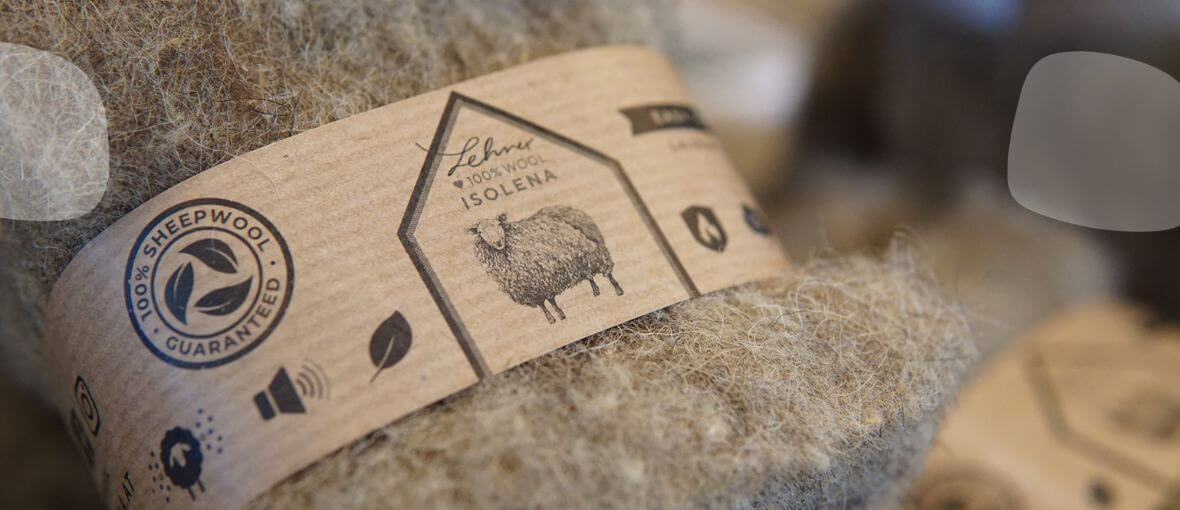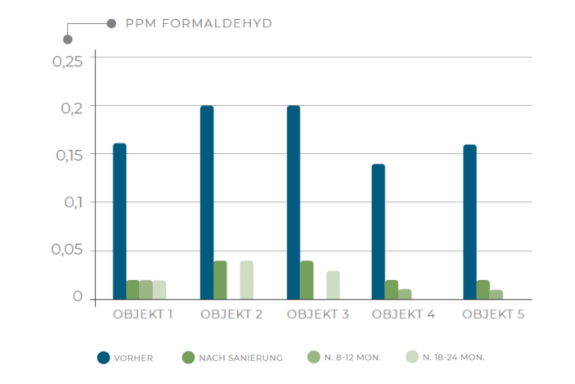
Sheep's wool insulation
Sheep's wool is the only naturally occurring insulating material that both keeps you warm and protects you from heat, cold and moisture. The uniqueness of the raw fibre sheep's wool also makes it a material with unique, natural advantages in its end product. At ISOLENA, our commitment, research and development provide even more benefits.
Sheep's wool has the best insulation values

The thermal conductivity is one of the most important insulation values for assessing the effect of insulating materials. It is measured in W/mK (watts per metre and Kelvin) and is also known as the lambda value (λtr). The thermal conductivity indicates the amount of heat that passes through the building material.
For a material to act as insulation, it should have a value below 0.1 W/mK. The rule is: the lower the thermal conductivity, the better. ISOLENA sheep's wool insulation has a very good insulation value of 0.033 - 0.038 W/mK.
The actual thermal conductivity is calculated from the combination of materials used. Wood, for example, has a good thermal conductivity value and therefore 'helps' other materials with thermal insulation.
Sheep's wool purifies the indoor air

Healthy indoor climate
Sheep's wool naturally creates a healthy indoor climate and therefore promotes your health. Sheep's wool has been proven to be able to degrade pollutants and odours, as shown in the adjacent measurement by the German Wool Research Institute.
The secret behind this excellent ability is keratin, the basic protein building block that makes up sheep's wool. The molecules of the amino acid side branches are able to absorb and neutralise pollutants such as formaldehyde. This results in a chemical reaction, whereby the pollutants are converted or bound to these molecules.
The closer the sheep's wool is installed to the interior, the better the positive effect on the indoor climate. For example, installation levels, partition walls and suspended ceilings with sheep's wool insulation have a high effect on the indoor air.
No fibre pollution in the room air
Our sheep's wool has the necessary properties to ensure that the indoor air is not contaminated with fibres. Due to "spinning technology", ISOLENA products contain sheep's wool fibres with a minimum length of approx. 20 mm.
As the fleece rolls are cut at the side edges for assembly, it is possible that shorter fibres may occur there and come loose during installation. When installed, no more fibres escape and therefore fibre contamination of the room air can be ruled out.

Sheep's wool regulates moisture

Sheep's wool has a hygroscopic effect, i.e. it binds moisture if the humidity is higher than the equalising humidity of the wool. If the room air is too dry, it releases the moisture again.
Sheep's wool can absorb up to 33 % of its own weight in moisture without losing its insulating properties and without being "wet". It retains its bulkiness without damaging the building fabric.
The ability to bind moisture is a great advantage, for example, in installation situations with a high level of condensation. Another natural advantage of the protein fibre is that it does not form a breeding ground for mould. Sheep's wool is therefore naturally protected against mould and thus ensures healthy indoor air.
Fire protection with sheep's wool

Thanks to the consistent use of 100 % virgin sheep's wool, the special ISOLENA processing technology and the innovative, biocide-free wool protection Ionic Protect®, our sheep's wool insulation achieves - depending on the product and structure - a fire classification of B1, C or D according to EN 13 501-1..
The natural fibre of sheep's wool has a auto-ignition temperature of 560-600° C. This is around twice as high as for wood (270° C). It melts away from any heat source without dripping.



The fire behaviour always depends on the overall structure. ISOLENA is the only natural insulation material to date that has the following acoustic ceiling element the fire classification B1 achieved:
- Perforated plasterboard,
Thickness 12 mm, perforation Ø 18/18 - 5 mm - ISOLENA Optimal, thickness 40 mm,
Density 18 kg/m3, 60 mm rear ventilation
In accordance with the Önorm EN 13501-1 the described building product is classified with regard to its fire behaviour as B s1, d0.

Sheep's wool insulation reduces noise

Sheep's wool has a high different fibre fineness Very good sound absorption properties for many acoustic situations with high demands.
You can equip acoustic ceilings with special ISOLENA acoustic fleeces or simply with ISOLENA sheep's wool felts.
For good reason, our acoustic products are increasingly being used by architects, building physicists and developers in kindergartens and schools, office buildings, event rooms and also in private homes.
A renewable raw material

Sheep's wool, the sustainable resource
Our aim at Lehner Wool has always been to utilise the natural properties of the sustainable raw material sheep's wool and demonstrate its positive effects.
Sheep's wool insulation is environmentally conscious and ecological The wool of live sheep is the insulating material of the present and future. Because only wool from live sheep is suitable for the production of insulation materials with such high quality standards.
Only this is and remains as permanently elastic, fluffy and lively as it needs to be to fulfil its many tasks as an insulating material.
The Lehner wool cycle
- We source our sheep's wool from partners whom Ecological criteria are important.
- According to the Animal Welfare Act, sheep must shorn depending on the breed 1-2 x / year.
- The valuable raw material sheep's wool is naturally washed with soda and curd soap.
- We produce sustainable products from virgin sheep's wool: from yarns and felts to carpets, acoustic products and insulating materials.
- Our high-quality products are all characterised by durability and are used for generations.
- Sheep's wool is the only natural insulating material that intergrates 100% into the natural cycle and is completely harmlessly compostable.

Resistant to moths with Ionic Protect®
Ionic Protect® is a patent-protected brand developed by ISOLENA, biocide-free Procedure for Protection of wool from all wool pests.
Plasma ion treatment of the wool fibers protects them from all negative influences that can occur in construction. So you don't give moths and insects a chance. In addition, our products can be stored indefinitely thanks to the wool protection.
We give you this in writing with our product assurance.
Easy installation of the insulation
Our ISOLENA sheep's wool insulation is supplied ready-made to size. This makes it easy for you to work with.
The rolls are easy to carry and you need no dust mask or protective clothing, as the sheep's wool is very skin- and health-friendly during further processing.
Cutting to length is very simple and can be done by hand or with the ISOLENA cutter.
Take a look at our installation videos to see how easily and quickly you can insulate with sheep's wool.
Certified origin and processing

Our sheep's wool for ISOLENA products comes directly from nature, or more precisely: largely from sheep from Central Europe.
All ISOLENA products bear the natureplus® certificate, the most comprehensive and demanding type 1 label for building products in Europe: it recognises holistically sustainable building products that meet strict criteria in terms of climate protection, healthy living and resource conservation.
Products with this label are predominantly made from renewable or environmentally friendly raw materials. Demanding tests and Europe-wide strict limit values for harmful substances guarantee the safety of the certified products.
You can find more details on buying wool and processing here »
Saving CO₂ with sheep's wool

In view of the effects of climate change and the associated demands on the construction industry, we would like to emphasise the CO2-saving potential of sheep's wool. Especially in the life cycle phases of production (A1-A3) and recycling (D) in accordance with DIN EN 15804, sheep's wool offers great opportunities for CO2 reduction and binding.
This is mainly due to two factors:
- One is the raw wool that is used. Due to its structure and fibre length, it is unsuitable for other purposes and would otherwise have to be disposed of.
- Secondly, the resource cycle: because the insulation material can be reintegrated into the production cycle at the end of its useful life without additional energy input and processed into new insulation material.
With our CO2-Calculator developed by the IBO (Austrian Institute for Building and Ecology), we can quickly and precisely calculate and show CO2 savings compared to various insulation materials for specific building projects.
Savings example: detached house with 60m³ insulation volume
If you compare the life cycle assessment of different insulation materials for an entire building project, it becomes clear what CO2 savings potential lies in the use of sheep's wool insulation:
- ISOLENA sheep's wool insulation achieves savings of 898 kg CO2-eq.
With a GWP total (A1-A3) of -19.3 kg CO2-eq. - Insulate in the same project with glass wool this causes emissions of 2.610 kg CO2-eq. ISOLENA therefore saves 3,508 kg CO2-eq in comparison.
- Insulating with rock wool even causes emissions of 3,387 kg CO2-eq. ISOLENA therefore saves 4,285 kg CO2-eq in comparison.
To make the figures more tangible: For glass wool, the CO2 emissions correspond to one tonne of cargo circumnavigating the globe 8.3 times. In the case of rock wool, the freighter even travels around the globe 10 times.</span
Data basis: ISOLENA Environmental Product Declaration (EPD) according to EN 15804+A2, with database ecoinvent v3.9.1 of Bau EPD GmbH, third-party verified according to the rules of the ECO-Platform, baubook guideline value table, and International Chamber of Shipping


Want to have everything at a glance again? No problem! We have summarised the most important information for you in our FAQ sheet - supplemented by many other interesting questions that we are often asked.
A compact collection of expert knowledge - clear, precise and to the point. The whole thing is clearly laid out, ideal for printing out so that you always have it to hand.
Curious? Then download the FAQ sheet and discover all the questions and answers at a glance!
Whether you are an architect, fabricator or retailer - we support you with expertise, tested solutions and honest advice. You will receive answers, inspiration and suitable products made from sheep's wool. Sustainable. Effective. From a single source.

